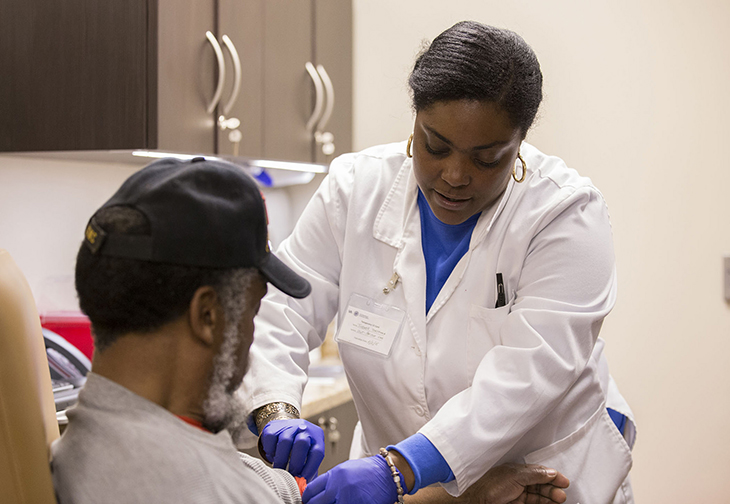In our previous article, How to Be Your Own Health Care Advocate, we began sharing the importance of the relationship between patients and physicians and how to get the most from that relationship. The first visit with a physician often occurs under stressful times, when you’re not feeling well, sometimes in pain, and most often, anxious about what the experience will be.
In order for your physician to determine how to best assist you, be prepared for a thorough exchange of information. Obviously, you both will need to ask questions, which unfortunately, is where some of the problems begin. Some patients are intimidated by the authority figure that doctors represent.
Others may believe that doctors are too busy, and then there are those who might be so new to their own medical condition that they don’t even know just what questions they should ask.
By asking questions, you, as a patient, can get information about:
- What your diagnosis means to your health and future
- What kinds of test you may need
- What treatment options might be available
- And what exactly you might be able to do to start feeling better
Whether you’re going for a routine medical check-up, or you’re a patient in a hospital, it may be helpful to have a friend or family member with you. It’s always beneficial, whenever possible, to prepare for your visit with your doctor. So, just what kinds of questions should you ask, and how do you do that so you will gain the kind of information that you will need to participate in the treatment plan that your doctor might recommend? Asking questions in an open-ended manner, rather than those that can be answered with a more limiting “yes” or “no” will promote conversation and discussion.
For example “Will I need to have surgery?”will be less effective than, “Can you explain what my treatment options might be?”
Some basic questions that you might want to ask before considering treatment may include some of the following:
- What do I have, and can you explain that to me?
- What treatment are you recommendingand can you explain its risks and benefits?
- If I decide not to accept that treatment, what will happen to me? Are there treatments available other than what you’re recommending, and can you tell me about some of those?
Because some physicians use medical jargon when speaking to their patients, don’t be afraid to let your doctor know that you don’t understand. There may be a lot of information shared during each visit with a doctor, and even more if you have several conditions and many different doctors. Therefore, it’s always a good idea to take notes,or have someone with you who can. Depending upon the purpose of your visit, and if you do need to have a more in-depth discussion with your doctor, or if this is your first visit to establish a relationship with someone who would be your primary care physician, it might be a good idea to see if you can schedule a visit with the doctor when there may be more time, perhaps at the end of the day.
Hopefully, these suggestions will help you during future physician visits. In the coming months, we’ll provide additional suggestions to help make the relationship that you have with your physician a more successful one. If you have any topics or areas you’d like addressed, please feel free to contact me.

Topics in this story
More Stories
Soldiers' Angels volunteers provide compassion and dedication to service members, Veterans, caregivers and survivors.
Veterans are nearly three times more likely to own a franchise compared to non-Veterans.
The Social Security Administration is hoping to make applying for Supplemental Security Income (SSI) a whole lot easier, announcing it will start offering online, streamlined applications for some applicants.







july 3, 2015
hello folks,
i haven’t been on here in a while cause i have been sick. but the reason for today is that my husband is a disabled navy veteran and yesterday we went to the va hostital in muskogee for a 12:00 walk-in visit to the dentist. when we got to the hospital we had parke at the closest entrance to save alot of walking because he can’t walk distances without hurting. what we came across was the entry was locked as well for all the others except the emergency entrance, come to find out the whole hospital was closed down except for the er. i don’t know about you but that is the first time i have ever come across a whole hospital closed doun. certainly one that we the veterans and families have worked and served so that our veterans can get the care that they need. but this isn’t a complaint concerning my husband it is for all our vets. the whole time that we were there not any of us knew of the closing of the hospital. the majoority had to walk the distance of 3 locked entrances that were locked and a good part of the vets had a hard time walking it also. there were no signs up in the parking lot on the doors or anywhere else stating the lock down. we happened to find out due to maintenance folks who were outside working. do all hospitals close down for holidays. i maybe would not have been so surprised if it had been on a monday because that is the day that the government chose to have and gives most people a three day most there 3-day week-end. but this is friday and the holiday is independenc day probably not that significant to most but to me it is. while talking to others come to find out when they choose to take the third day but we certainly didn’t expect it to be on a fridsay. i am posting this anywhere i can and hope that others do also. we wifll be talking to patient advocacy and admitnistration by phone and written. are me and my husband the only ones who are concerned about this. is there other hospitals who do the same, if there is please let me and others know. our vets shouldn’t have to suffer because others want to take off all at the same time. i mean really who among us can pick and choose choose when they get sick or needs their meds or any of the services that should be provided them.
i know that our vets didn’t have the luxury of serving choose when, where, what they had to do to serve this great notion. they sure couldn’t say i don’t think i will do my job today i think i will just sit here awhile and mybe go out and serve my nation tomorrow or the next day. they didn’t have those freedoms as the ones that they fought for do. shouldn’t we be there to serve them as they have (and are still doing) served and sacrificed for us. please pass this forward, post, call write anyone you can think of to keep our vets served as they have served us. thank you all for listing, God bless and stay safe.